South Africa
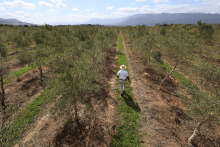
An executive order from the White House took aim at recent policies in South Africa designed to heal old wounds left over from apartheid. Now, a group of white South African religious leaders are pushing back on President Donald Trump's claims.
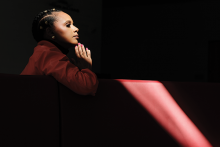
WHEN RAHIEL TESFAMARIAM was 5 years old, she and her mother flew from Eritrea to New York City, arriving in the United States with six-month tourist visas to help prepare for Tesfamariam’s eldest sister’s wedding. After the six months had passed, Tesfamariam’s mother began packing clothes for a return trip to Eritrea, but Tesfamariam adamantly refused to leave. Tesfamariam’s brother recalls being at the airport and watching their mother step to the gate; Rahiel stepped back and said, “Bye, Mommy.” And so it was: Rahiel Tesfamariam remained in the United States in the care of her siblings, out of the shadow of the Eritrean War of Independence, with an expired travel visa.
The rest of her story could be told this way: She became a legal permanent resident of the United States, graduated from Stanford University, became the youngest-ever editor in chief of The Washington Informer, received her Master of Divinity degree from Yale University, and launched Urban Cusp, an online community for Black millennials interested in the intersection between faith, culture, and justice. Tesfamariam worked as a columnist for The Washington Post; led #NotOneDime, a national Black Friday economic boycott during the 2014 Ferguson protests; and was named by Essence magazine as one of its “New Civil Rights Leaders.” She got married. She became a mother. It could be said that Tesfamariam pulled herself up into the American dream.
Tesfamariam’s book Imagine Freedom: Transforming Pain into Political and Spiritual Power (Amistad), released earlier this year, tells that story, but with a difference. Telling only that version, like the American dream itself, would be insufficient. Tesfamariam spoke with Sojourners associate editor Darren Saint-Ulysse in April about how she carries Africa within, political power’s ephemeral nature, and God’s command to free the captives. — The Editors
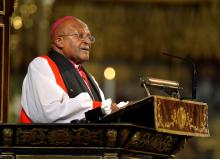
Desmond Mpilo Tutu, the Nobel Peace laureate whose moral might permeated South African society during apartheid's darkest hours and into the uncharted territory of new democracy, died on Sunday. He was 90.
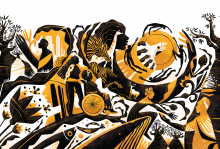
In a real sense all life is interrelated. All [people] are caught in an inescapable network of mutuality, tied in a single garment of destiny. Whatever affects one directly, affects all indirectly. I can never be what I ought to be until you are what you ought to be, and you can never be what you ought to be until I am what I ought to be. ... This is the interrelated structure of reality. —Martin Luther King Jr.
WHEN I STUDIED abroad in South Africa in 1996, I learned much about the power of interdependence and mutuality. There I encountered and experienced the southern-African philosophy of ubuntu. Through Nelson Mandela’s moral leadership and embodiment of ubuntu, the nation was led through transformational change. Like Dr. King, Mandela refused to hate his enemies, including those who kept him imprisoned for 27 years, as he envisioned a future South Africa that included Black and white together.
Archbishop Desmond Tutu summarized ubuntu in what became a marker of both a movement and a philosophy: “I am because we are.” Mpyana Fulgence Nyengele, author of Cultivating Ubuntu, offers this definition: “Ubuntu is the substance and core being of a person and speaks particularly about the fact that we cannot be fully formed as human beings in isolation.” Rather, as Stephen Lewis, Matthew Wesley Williams, and Dori Baker share in Another Way, Nyengele explains that “it is only through our communal participation and interaction with other people that we begin to develop trust, compassion, caring, humility, kindness, and forgiveness, which are all qualities of what it means to be human and humane toward others. Similar to the fruit of the spirit, ubuntu is possible because ntu or Spirit ‘orients persons toward life-giving choices, actions and behaviors.’ ... Therefore, ‘ubuntu promotes and enhances the abundance of human life in community and beyond.’”
I think of ubuntu as an expanded, vivid version of the Golden Rule: We are called to do unto others as we would have them do unto us. Or, as King so often put it, we are to be “our brothers’ and sisters’ keeper.”
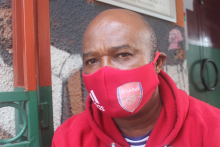
Azubuike Muodum, a Nigerian migrant living in Johannesburg, South Africa has not had his worst COVID-19 fears realized.
“When the [pandemic] started, I thought it was a disease that is going to kill everyone, more like an end-time plague,” Muodum told Sojourners in May.
Still, the last two years have had challenges. Muodum runs a small-scale restaurant in the central business district of Johannesburg, South Africa; he says the pandemic and subsequent lockdown created a “huge burden” for him and his restaurant. While countries like the United States begin returning to post-pandemic life, Muodum and others who emigrated to South Africa are facing the challenges of a still-spreading COVID-19.
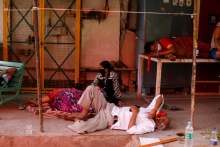
It is painful to know that here in the U.S., some states have vaccines that are going unused when vaccine shortages exist around the world.
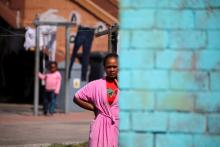
“I was very scared when I saw them coming with their trucks,” Annie Paul, who was inside her shack on the day of the demolition, said. “Before I could pick up some of my stuff to leave, they had already started pulling the building down and in a matter of minutes, everything was gone. They didn’t allow us to pick anything.”
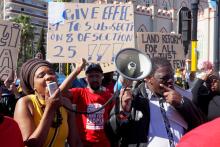
Lessons we can learn from peacebuilding in South Africa and Rwanda.

In the years since, the predominant narrative of the TRC making great strides to heal apartheid has been re-examined. In focus group interviews with victims, analysis of the victims’ transcripts, and amnesty hearings, University of Connecticut researcher Audrey Chapman found a disparity between the goals of the TRC and of the South African people.
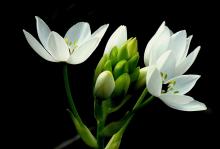
THE LONG-OVERDUE transition of power in South Africa this winter, from President Jacob Zuma to Cyril Ramaphosa, has sparked a resurgence of hope among younger church activists in the country. Zuma’s nine years in office were catastrophic to South Africa’s politics and social fabric through entrenched corruption and state capture. Zuma and his cronies enriched themselves while the economy stumbled, with unemployment now above 27 percent and schools and health care in an increasing state of crisis.
While Ramaphosa’s election by the National Assembly has inspired hope, an awakening less heralded and potentially more significant long term has been taking place across the church in South Africa. The theology of hope and liberation that helped fuel the anti-apartheid struggle played a formative role in shaping the public theology of many in the U.S. and around the world. Now a new generation of South African Christian activists is on the cutting edge of social transformation.
In the aftermath of Zuma’s resignation, a handful of these leaders addressed the catalytic role the church has played in shifting the political winds in South Africa and their hope for the future.
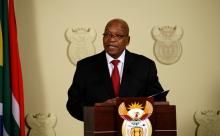
Jacob Zuma resigned as president of South Africa on Wednesday, reluctantly heeding orders by the ruling African National Congress (ANC) to bring an end to his nine scandal-plagued years in power.
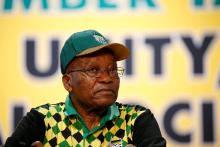
South African President Jacob Zuma's days as head of state appear numbered after his own party resolved to remove him from office at a marathon meeting that ended early on Tuesday morning.
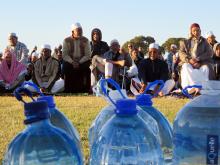
Government officials have provided scant details for Day Zero logistics. Rather than communicate a clear plan of action, some are invoking fear with comparisons to World War II and 9/11.
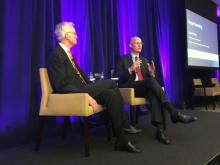
Critical to the success of the movement is the fact that corporations are not simply tolerating activists such as Daly.
Instead, they increasingly see the socially responsible agenda as good business; and, perhaps more important, so do investment firms that are responding to the growing demand for portfolios that reflect a client’s values while also making money as effectively as any other investment.
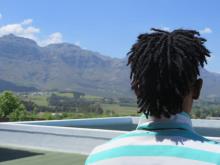
Amazigh was one of 125 queer Muslim activists and allies who came together for The Inner Circle’s seven-day Annual International Retreat, from Oct. 14 to Oct. 21, in South Africa. The gathering focused on “building a movement towards an all-inclusive and compassion-centered Islam,” a mammoth task for attendees like Amazigh who live in countries where homosexuality and transgender expression are often taboo and criminalized.
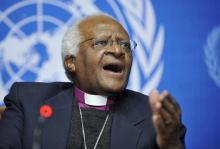
"‘Ubuntu’ is very difficult to render into a Western language. It speaks to the very essence of being human … it also means my humanity is caught up, is inextricably bound up, in theirs. We say, ‘A person is a person through other people.’"
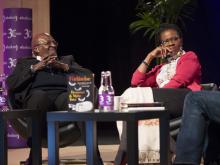
The daughter of Nobel laureate Archbishop Emeritus Desmond Tutu of South Africa has given up her clergy credentials after marrying a Dutch woman.
The Rev. Mpho Tutu told the local media that since her church did not recognize her wedding, she could no longer serve in the country.

An annual “snow bird” sojourn to South Africa was convicting. The constant news highlighted the American political “silly season” along with the drumbeat reports of President Jacob Zuma’s illegal brutish behavior. An African storekeeper exclaimed, “Do Republicans not see the Trump antics are undermining the good feelings we have because of President Obama’s accomplishments? We are afraid for all of us.”
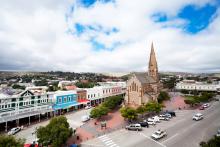
South Africa’s Anglican bishops have taken an initial step toward including LGBT people as full members of their congregations with the passage of a resolution at a meeting in the Grahamstown Diocese. The resolution now goes to the Provincial Synod, the church’s top decision-making body, which meets later this year, said Archbishop Thabo Makgoba of Cape Town.
It occurred to me: South Africa is no longer under legal apartheid, but apartheid still thrives here — through de facto economic segregation. There are no signs that say “whites only” as they did under apartheid, but there has also been no move by the black government to restore the people to the land that was taken from them.
One question haunted me: How does a white Christian South African live in this apartheid from day to day? 1) One must actively fight injustice, or 2) she must embrace a theology that has nothing to do with it.